
Abuja, Nigeria. June 12th, 2024 – A new public opinion poll conducted by NOIPolls has revealed that corruption is the major challenge facing democratic rule in Nigeria as stated by 26 percent of adult Nigerians interviewed nationwide. Other challenges adduced by respondents include bad governance (20 percent), weak government institutions (18 percent) and insecurity (9 percent) amongst other challenges mentioned. This finding is further corroborated by the findings of Price water Cooper, a professional services organisation which stated that corruption could gulp up to 37 percent of Nigeria’s GDP by 2030. The report further revealed that the cost of corruption will be around 2000 USD per person by the year 2030 if not curtailed[1].
Furthermore, the poll result revealed that most adult Nigerians (74 percent) lamented they are not satisfied with democratic rule. Economic hardship (27 percent), high cost of living (20 percent), and no dividends of democracy (17 percent) were the top-mentioned reasons for their dissatisfaction with democratic dispensations. On the flip side, 25 percent gave thumbs-up with a greater number of respondents (34 percent) citing freedom of expression as a top reason. This finding corroborates the publication of Business Day newspaper which says ‘’ Nigeria’s democracy has been a story of trials and triumphs over the past 25 years. While the country has faced political instability, corruption, security threats, and economic challenges, it has also seen democracy gradually take root, granting citizens’ rights and freedoms unknown during military rule’’[2].
Additionally, respondents were asked to rate some key sectors under democratic rule in the country using a scale of 1 to 5, where 1 is very poor and 5 is very good. The poll findings revealed that majority of adult Nigerians (83 percent) interviewed rated economy as the poorest amongst the sectors under review. This is followed by electricity (79 percent), security (68 percent), Agriculture (65 percent), social amenities (63 percent), education (58 percent) amongst others ratings.
Subsequently, the survey also sought to measure the level of trust Nigerians have in some public institutions who engage most with the general public using a scale of 1 to 5, where 1 cannot be trusted at all, and 5 can be trusted a lot. The poll findings revealed that 62 percent of Nigerians disclosed that they have no trust in Independent National Electoral Commission (INEC) and this represents the highest number of respondents. This is followed by those who mentioned the Police (57 percent), the Judiciary (54 percent), Economic and Financial Crimes Commission (EFCC) amongst others. Interestingly, on the contrary, a significant proportion of Nigerians (47 percent) revealed that they trust religious leaders more than public institutions. This is followed by 43 percent who say they trust the military and 40 percent traditional rulers.
With regards to voter’s apathy, the findings revealed that almost half of the respondents (48 percent) interviewed believe that their votes do not count hence the main reason for low voters’ turnout during elections. Other reasons mentioned include lack of trust in politicians (20 percent), lack of trust in INEC (18 percent), fear of violence eruption (9 percent) and insecurity (9 percent) amongst other reasons.
More findings revealed that 45 percent of the respondents want the government to focus on security within the next year. This is followed by the economy (39 percent) and education (37 percent). Other areas mentioned are food security (29 percent), electricity (28 percent), healthcare (24 percent), and job creation (22 percent). These are some of the key findings from the Democracy Day Poll conducted in the week commencing May 8th, 2024.
Background
Democracy Day is one of the most important days in the history of Nigeria[3]. It is a national public holiday in Nigeria to commemorate the restoration of democracy in 1999 marking an end to military rule in the country and it was symbolized by the swearing-in of the first President-elect, Olusegun Obasanjo, on May 29, 1999. Until 2018, it was celebrated annually on May 29[4].
On June 6, 2018, eight days after May 29, 2018, celebrated as Democracy Day, the immediate past administration of President Muhammadu Buhari, declared June 12 as the new Democracy Day, to commemorate the events of the day of the Presidential election in 1993 when results indicated a win for MKO Abiola of the Social Democratic Party (SDP), against Bashir Tofa of the National Republican Convention (NRC). Abiola was never declared winner as the then Head of State General Ibrahim Badamosi Babangida annulled the polls citing irregularities. It is a tradition that has been held annually, beginning in the year 2000. June 12 was formerly known as Abiola Day, celebrated in Lagos and some South-Western states of Nigeria[5].
Democracy Day is celebrated in many different ways. It is a day to both honour the struggles and sacrifices on the path toward democracy. Democracy Day is also an opportunity to create awareness amongst Nigerians regarding the importance of participating in the political process and to encourage younger people to value the rights for which so many people worked so hard[6]. But the big question is: ‘’ Has democracy in Nigeria fared well since 1999?’’. Dr Obiageli Ezekwesili, the former Vice-President of the World Bank's Africa Division, and a former Minister of Education and co-founder of the #BringBackOurGirls movement-maintained that Democracy in practice and principle has been turbulent for Nigeria. She added that the voice of the citizens, in the long run, could make a difference in the democratic process of the country[7].
More so, the Democracy Watch Reports, a compilation of reports that examine the state of democracy in Nigeria since May 1999, were unveiled by CDD-West Africa Director Idayat Hassan in Abuja. Presenting a broad overview of the reports, Hassan noted that despite 25 consecutive years of democratic rule, “it is still going to be a long walk to freedom” for Nigerians because democracy has not improved the economic and human rights situation of Nigerians. In his words, ‘’we appreciate the improvements in the conduct of periodic elections even though it is still far from the ideals, there has not been much improvement in civil liberties and the economy of Nigeria’’[8].The CDD-West Africa Director added that the development was disturbing as it would be “a fatal mistake to celebrate democracy only in name rather than an improvement in the dividends of democracy and how that reflects in the state of the economy.[9]”
In the overview of the Democracy Watch Reports, CDD-West Africa explained that the dividends of democracy were not necessarily infrastructures as even authoritarian governments, including the military, had been noted to provide some basic infrastructures. According to the centre, dividends of democracy encapsulated such attributes as popular participation, rule of law, respect for human rights, accountability, transparency, predictability, competition and economic freedom, amongst others[10]. Against this background, NOIPolls surveyed to find out the views of Nigerians regarding democracy day and presents its findings.
Survey Findings
Public Satisfaction with Democracy in Nigeria
The first question sought to gauge citizen’s satisfaction with democratic rule in Nigeria. The survey result revealed that most adult Nigerians nationwide are dissatisfied with democratic rule in Nigeria as disclosed by 74 percent of the proportion polled. On the other hand, while 25 percent of the respondents say they are satisfied, 10 percent of the respondents indicated that they were neither satisfied nor dissatisfied with democracy

Subsequently, the majority, (74 percent) of the respondents who stated that they were displeased with the democratic rule in Nigeria were further probed and findings revealed that respondents mostly lamented over the high cost of living (47 percent), poor governance (20 percent) and lack of dividends of democracy (17 percent) amongst other reasons.
On the contrary, 25 percent of the respondents who stated that they are satisfied with the democratic rule were further asked for their reason and 34 percent of the respondents stated that they enjoy the freedom of expression, dividends of democracy (19 percent) and that the government is doing its best (16 percent) amongst other reasons.

Challenges to Democracy in Nigeria
Additionally, respondents were asked what they think is the major challenge facing democracy in Nigeria. The poll findings revealed that corruption is the major challenge facing democracy in Nigeria as stated by 26 percent of those interviewed. Other challenges mentioned by Nigerians include bad governance (20 percent), weak government institutions (18 percent) and insecurity (9 percent) amongst other challenges.
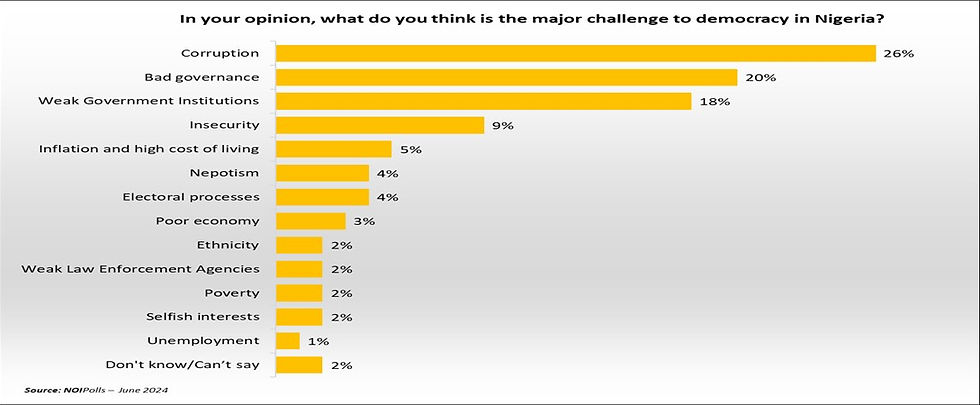
Evaluation of Governments’ Performance Across Key Sectors in Nigeria
Furthermore, respondents were asked to rate some key sectors under democratic rule in the country using a scale of 1 to 5, where 1 is very poor and 5 is very good. The poll findings revealed that majority of adult Nigerians (83 percent) interviewed rated economy as the poorest rating amongst the sectors under review. This is followed by electricity (79 percent), security (68 percent), Agriculture (65 percent), social amenities (63 percent), education (58 percent) amongst others ratings.
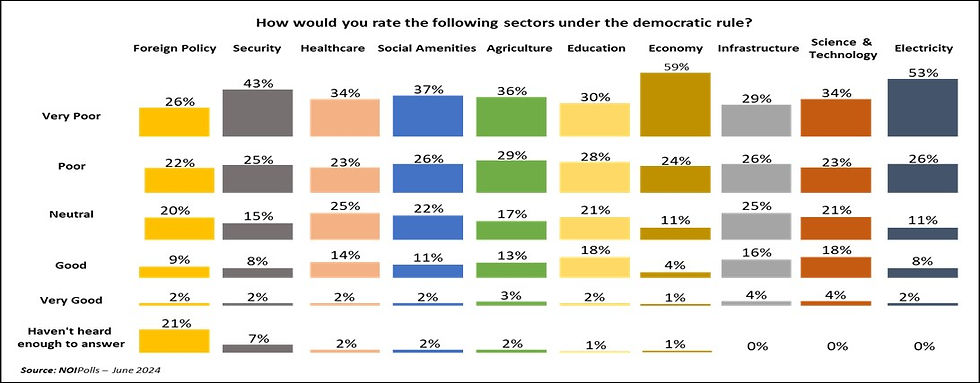
Trust In Public Institutions
Furthermore, the survey also sought to measure the level of trust Nigerians have on some public institutions who engage most with the general public using a scale of 1 to 5, where 1 is cannot be trusted at all, and 5 is can be trusted a lot. The poll findings revealed that 62 percent of Nigerians say that they have no trust in Independent National Electoral Commission (INEC) and this represents the highest proportion of respondents. This is followed by those who mentioned the Police (57 percent), the Judiciary (54 percent), Economic and Financial Crimes Commission (EFCC) amongst others.
On the other hand, a significant proportion of Nigerians (47 percent) revealed they trust religious leaders more than the public institutions. This is also followed by 43 percent who say they trust the military and 40 percent traditional rulers.

Voting Behaviour and Belief
In order to determine voting behaviour amongst adult Nigerians, respondents were asked if they have voted before or not. Findings revealed that the vast majority (93 percent) answered in the affirmative. This cuts across gender, geo-political zones and age-group.

Most of the respondents who disclosed that they have voted before were further asked the number of times they have participated in the exercise and findings revealed that a higher proportion of respondents (31 percent) have voted nine times and above.
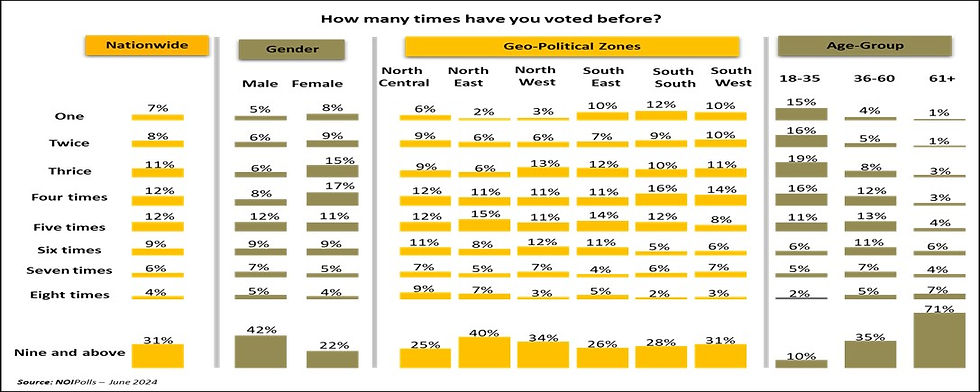
With regards to voter’s apathy, the findings revealed that a higher proportion of respondents (48 percent) interviewed believe that their votes do not count and that is the major reason for low voters’ turnout during elections. Other reasons mentioned include lack of trust in politicians (20 percent), lack of trust in INEC (18 percent), fear of violence eruption (9 percent) and insecurity (9 percent) amongst other reasons.

When asked to rate the performance of the Independent National Electoral Commission (INEC) in terms of efficiency and fairness during elections in Nigeria, findings showed that 59 percent of the respondents accounting for a higher proportion surveyed, rated the election umpire poor as opposed to 17 percent who gave a thump up. However, 24 percent maintained a neutral stance.
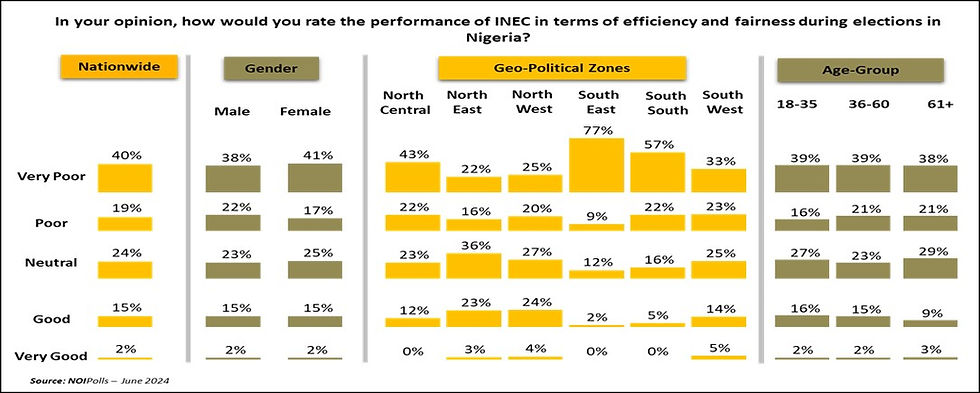
Public Optimism for the Future
The survey also sought to know the level of optimism of respondents on the future of democracy in the country. Findings revealed that a larger proportion of respondents (60 percent) have high hopes regarding the future of democracy in Nigeria. On the contrary, 22 percent expressed pessimism while 18 percent were neutral.

Respondents were further asked to mention three top areas they expect the government to focus its attention in the next one year. Findings revealed that more respondents (45 percent) want the government to focus on security. This is followed by the economy (39 percent) and education (37 percent). Other areas mentioned are food security (29 percent), electricity (28 percent), healthcare (24 percent), job creation (22 percent).
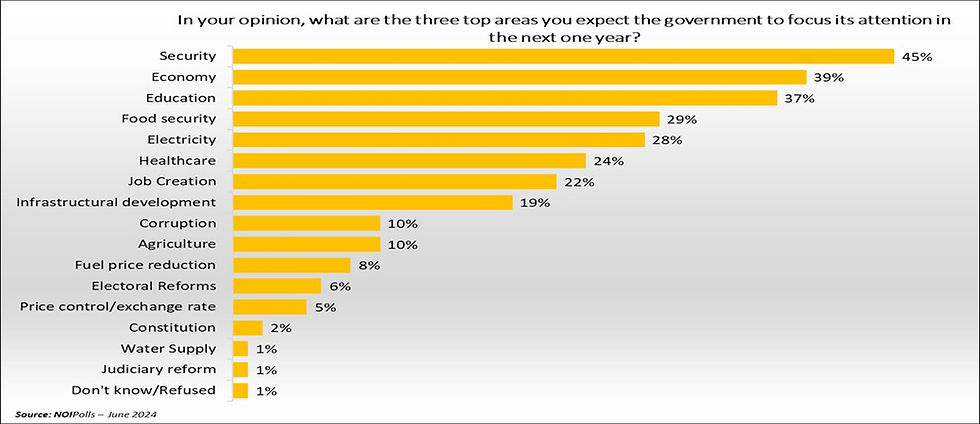
Conclusion
Findings from the survey have shown that majority of adult Nigerians (74 percent) interviewed are not satisfied with democratic rule and have cited several reasons for their dissatisfaction among which include, Economic hardship (27 percent), high cost of living (20 percent), and no dividends of democracy (17 percent). Despite these issues, a significant proportion of respondents (60 percent) have remained optimistic about the future of Nigerian democracy. In the same vein, 26 percent of Nigerians mentioned corruption as the major challenge facing democratic rule in the country.
Furthermore, the poll result has also shown that respondents have little or no trust at all in some institutions of the country under the democratic rule with a larger proportion (62 percent) not trusting the Independent National Electoral Commission (INEC) and this is followed by the police (57 percent), the judiciary (54 percent). This is calling on public institutions in the country to improve on the glaring trust deficit expressed by adult Nigerians as revealed in this survey. On the other hand, almost half of the respondents (47 percent) disclosed that they trust religious leaders, the military (43 percent) and traditional rulers (40 percent).
Finally, findings also revealed that respondents cited security (45 percent), economy (39 percent) and education (37 percent) as the three top areas they expect the federal government to focus its attention on in the next year. The Federal government must strengthen our institutions, ensure accountability and transparency, and revive key sectors so citizens can enjoy the dividends of democracy in earnest and confidence in democratic rule will be restored.
Survey Methods
The opinion poll was conducted in the week commencing May 20th, 2024. It involved telephone interviews of a proportionate nationwide sample of 1,000 randomly selected phone-owning Nigerians aged 18 years and above, representing the six geo-political regions and 36 states and the FCT of the country. Interviews were conducted in 5 languages – Igbo, Hausa, Yoruba, Pidgin English, and English. Although we can say with 95% confidence that the results obtained were statistically precise – within a margin of error of plus or minus 4.65%; we recognize that the exclusive use of telephone polling has its limitation of excluding non-phone-owning Nigerians. Nonetheless, with the country’s tele density put over 100 per cent by the Nigerian Communications Commission (NCC), we consider our telephone polling approach appropriate. Also, given the rigorous scientific process of randomization and stratification applied, we can confidently stand by the validity of our methodology and approach. NOIPolls Limited, No. 1 for country-specific polling services in West Africa. We conduct periodic opinion polls and studies on various socio-economic and political issues in Nigeria. More information is available at www.noi-polls.com.
Disclaimer
This press release has been produced by NOIPolls Limited to provide information on all issues which form the subject matter of the document. Kindly note that while we are willing to share results from our polls with the public, we only request that NOIPolls be acknowledged as authors whenever and wherever our poll results are used, cited, or published. NOIPolls hereby certifies that all the views expressed in this document accurately reflect the views of respondents surveyed for the poll, and background information is based on information from various sources that it believes are reliable; however, no representation is made that it is accurate or complete. Whilst reasonable care has been taken in preparing this document, no responsibility or liability is accepted for errors or facts, or any views expressed herein by NOIPolls for actions taken because of information provided in this report. Any ratings, forecasts, estimates, opinions, or views herein constitute a judgment as of the date of this document. If the date of this document is not current, the views and content may not reflect NOIPolls' current findings and/or thinking.
Press Contact
Email:
Number: +234 (0) 9 - 290 4162
+234 (0) 9 – 291 4877
[2] https://businessday.ng/backpage/article/revisiting-nigerias-democratic-journey-a-mixed-picture-of-economic-performance/
[7]https://www.nigeriainfo.fm/lagos/news/hardfacts/in-practice-and-in-principle-nigeria-has-not-fared-well-democratically-oby-ezekwesili/
[8]https://www.icirnigeria.org/democracy-has-not-improved-economy-civil-liberties-in-nigeria-after-22-years-cdd/







Comments